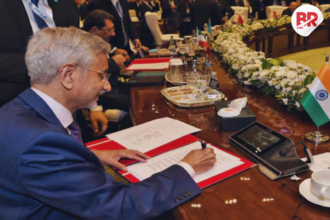
On April 10, the world witnessed another dramatic turn in the tense relationship between Washington and Moscow. In a high-profile US-Russia prisoner swap, two prisoners walked free—each carrying the weight of political games, global conflict, and personal loss.
Who is Ksenia Karelina?
Ksenia Karelina, a Los Angeles spa worker, had traveled to her hometown of Yekaterinburg, Russia, in early 2024 to visit her family. What should have been a short family reunion turned into a nightmare.

Russian authorities arrested Karelina in February after searching her phone. They discovered that she had donated around $50 to a New York-based charity, Razom for Ukraine. The Federal Security Service (FSB) claimed the donation supported the Ukrainian military. The charity, however, insists all funds go toward humanitarian aid.
Charged with treason, Karelina hoped a guilty plea might reduce her sentence. But in August, she was convicted and sentenced to 12 years in a Russian prison.
Who is Arthur Petrov?
On the other end of this exchange was Arthur Petrov, a dual Russian-German citizen. He was arrested in Cyprus in August 2023, following a U.S. request. Petrov was accused of smuggling restricted American electronics to companies supplying Russia’s military.
According to the U.S. Department of Justice, Petrov used fake companies to hide the final destination of sensitive microchips—Russia. He worked for Electrocom VPK, a Russian company linked to defense manufacturing.
Petrov was extradited to the U.S., where he faced multiple charges, including conspiracy, smuggling, violating export laws, and money laundering.
Also Read: In Istanbul, US-Russia Talks Quietly Tackle Embassy Crisis—Not the War
What does the US-Russia prisoner swap 2024 mean?
This US-Russia prisoner swap is not just about two individuals. It reflects how everyday people can become pawns in the larger game of geopolitics.
Karelina’s case highlights growing tensions over the Ukraine war and how even minor acts, like a small donation, can become grounds for serious charges in Russia. Meanwhile, Petrov’s case shows how the war has spilled into economic and tech sectors, with U.S. export controls becoming a battleground.
Such swaps are rare but not new. In recent years, Russia and the U.S. have exchanged prisoners amid rising diplomatic strains. Previous examples include the release of basketball star Brittney Griner in 2022.
What happens next?
Karelina has returned to the U.S. and is expected to reunite with her family. There is no word yet on what legal outcomes Petrov may face now that he has been handed over to Russia.
But one thing is clear: more such swaps may follow as the war in Ukraine and U.S.-Russia relations continue to evolve.
Also Read: AUKUS Nuclear Submarine Deal Faces Backlash Over China Conflict Silence












